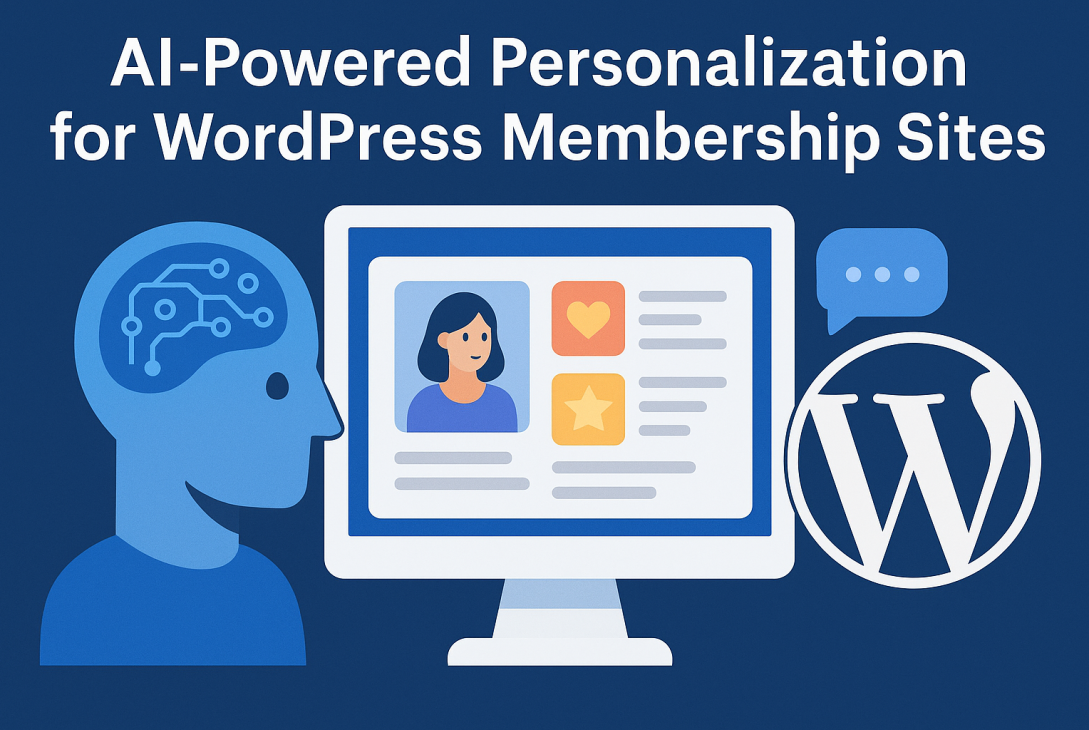AI Personalization for WordPress Membership Sites
In the ever-evolving digital landscape, personalization is no longer just a trend, it’s an expectation. For WordPress-based membership platforms, integrating artificial intelligence (AI) presents a powerful opportunity to deliver deeply engaging, hyper-relevant experiences to users.
From dynamically tailored learning paths to content recommendations that feel intuitive, AI is shaping the future of online communities and membership websites.
Let’s explore how AI can transform your WordPress membership platform, the technologies involved, real-world use cases, and how to implement these capabilities ethically and effectively.
Why Personalization Matters
In the context of membership-based websites, personalization isn’t just about convenience. It taps into core principles of behavioral psychology. When content, recommendations, or learning materials are customized based on a user’s actions or preferences, users feel seen, valued, and more connected to the platform.
The benefits are compelling:
- Increased engagement: Relevant content keeps users coming back
- Higher retention: Personalized experiences create emotional investment
- Boosted conversions: Users are more likely to upgrade when content resonates
Core Technologies That Power AI Personalization
Modern AI personalization is made possible through a mix of tools and technologies working together. At the heart of it are three core capabilities:
- Behavior Tracking
- Segmentation & Clustering
- AI-Driven Content Generation
Let’s explore how these function inside your WordPress membership ecosystem.
1. Behavior Tracking
Everything starts with data. To personalize effectively, you need to track how users interact with your content—what pages they visit, what quizzes they complete, what they skip, and how they navigate your platform.
Popular WordPress-compatible tools include:
- WP Fusion (tracks behaviors and syncs with CRM)
- Google Tag Manager + Google Analytics 4 (for event-based data tracking)
- Hotjar or Heap (for visual behavior like clicks, scrolls, and form interactions)
These tools build the behavioral foundation that AI will use to personalize your content.
2. Segmentation & Clustering
Once data is collected, machine learning comes into play. Algorithms analyze behavioral patterns and group users into segments:
- Fast learners vs. casual learners
- Content-focused vs. community-focused
- Desktop vs. mobile-first users
These personas allow your site to make intelligent decisions—serving different homepage experiences, customizing course recommendations, or even changing the tone of messages based on engagement type.
3. AI-Powered Content Generation
Finally, AI content engines like OpenAI’s GPT-4 can be used to:
- Generate personalized emails or summaries
- Create unique quiz questions based on user mistakes
- Write onboarding flows tailored to individual learning paths
All this content can be inserted directly into WordPress using shortcodes, REST APIs, or custom Gutenberg blocks—automating the human touch.
WordPress Integration Options for AI Personalization
You don’t need to build everything from scratch. Several WordPress plugins already support or extend AI personalization.
LearnDash with AI
LearnDash is a powerful LMS that’s well-suited for personalized learning paths. Using AI, you can dynamically adjust:
- Which lessons are shown based on quiz results
- Offer summaries for struggling learners
- Trigger rewards when goals are met
You can combine this with GPT to:
- Generate on-demand lesson recaps
- Provide smart feedback on quizzes
- Recommend next steps based on time spent or topic mastery
Tutor LMS Integration
Tutor LMS also works well with AI-driven customization. Here’s how you might use it:
- Detect drop-off points in a course using Google Analytics
- Use GPT to summarize skipped modules
- Auto-create quizzes from past learner feedback
With WP Fusion, you can even tag learners based on course behavior and trigger personalized follow-up emails or content adjustments.
MemberPress with ChatGPT
MemberPress is a robust membership plugin. It now supports ChatGPT integration, allowing you to:
- Generate marketing copy personalized to user preferences
- Create dynamic dashboards showing tailored next actions
- Offer real-time support and suggestions via chatbot
For example, if a user hasn’t logged in for 5 days, a GPT-generated message might say:
“We miss you! Here’s what you were working on. Want to jump back in with a quick recap?”
Tools That Fuel AI Personalization Behind the Scenes
Now let’s zoom in on three powerhouse tools that make this possible: WP Fusion, Hotjar, and Google Analytics 4.
WP Fusion: Connect WordPress to Your CRM Brain
WP Fusion is the bridge between WordPress and your CRM (like ActiveCampaign, Drip, FluentCRM, or HubSpot). It tracks on-site actions—like lesson completion, profile edits, video views—and applies tags or syncs custom fields.
How to Use It:
- Install WP Fusion
- Tag users based on behavior (e.g.,
completed_lesson_3,inactive_7_days) - Use those tags to control:
- Email automations (via CRM)
- Conditional content in WordPress
- Triggers for AI responses using webhooks
Example:
User fails a quiz → Tag applied needs_help → CRM triggers a Zapier webhook → OpenAI generates a supportive email + review content block → Displayed on their dashboard via shortcode
Hotjar: Visual Behavior You Can Act On
Hotjar gives you qualitative insight—heatmaps, session recordings, and surveys—so you can see where users are dropping off, struggling, or clicking the most.
It doesn’t directly power AI, but it gives the insights you need to decide where AI should intervene.
How to Use It:
- Add Hotjar to your site
- Identify friction points—e.g., users stop scrolling before finishing a module
- Use that insight to:
- Trigger AI-powered reminders
- Inject video recaps
- Suggest different formats (text vs. video)
Pro Tip: Combine Hotjar behavior with WP Fusion tagging. If a user keeps revisiting a page, but doesn’t proceed, apply the tag
stuck_userand use AI to assist.
Google Analytics 4 (GA4): Event Tracking with AI Potential
GA4 moves away from old session-based tracking to event-driven analytics. That’s perfect for AI workflows.
You can set up events for:
- Course starts or dropouts
- Scroll depth
- Form completions
- Button clicks
How to Use It:
- Set up custom events:
lesson_started,quiz_failed,no_progress_3_days - Create GA4 audiences: “Engaged learners who skipped Module 2”
- Export to CRM or trigger automations via Zapier/Make
- Connect OpenAI to generate personalized content or messaging
Use Case Spotlight: Adaptive Learning with AI
Let’s bring it all together with a real scenario.
Use Case: “Adaptive Learning Flow”
- User completes Module 1 in LearnDash
- WP Fusion tags them
completed_module_1 - GA4 notes they skipped the optional recap video
- After 3 days, they’ve made no further progress
- WP Fusion triggers an AI flow via Zapier:
- GPT writes a personalized nudge:
“Hey Jamie, we noticed you crushed Module 1! Want a shortcut through Module 2 based on your quiz results?”
- Recap generated via GPT and emailed or shown via shortcode
- Dashboard shows recommended lessons generated just for them
- GPT writes a personalized nudge:
Result: Increased engagement, faster course progression, and a happier member.
Frontend Implementation Ideas
AI content isn’t just for email. Use WordPress to display dynamic content areas:
- Shortcodes: Embed GPT content blocks inside lessons
- Custom Gutenberg blocks: Show smart dashboards per user tag
- REST API endpoints: Serve dynamic page sections personalized at load time
- Widgets: Sidebar modules change based on activity
Real-Time Recommendations for Communities
Even if you’re not offering courses, AI can enhance your member community:
- BuddyBoss + WP Fusion: Tag users based on group participation
- GPT Chatbots: Answer forum questions or direct users to helpful threads
- Profile completion nudges: Use AI to prompt users based on what’s missing
Ethical Considerations in AI Personalization
With great power comes great responsibility. AI can easily go from helpful to creepy without proper boundaries.
Best Practices:
- Be transparent about data collection
- Let users opt-out of personalization
- Regularly audit for bias or unfair outcomes
- Don’t over-automate—leave room for human touch
Your goal is empathy at scale, not automation overload.
Further Reading
To explore more:
- How WordPress AI Site Builders Are Changing Website Creation
- Using AI in WordPress for Personalized Learning
- Creating MemberPress Courses with ChatGPT
Let’s Talk About Making This Happen
Personalization doesn’t need to be overwhelming. Whether you’re enhancing an LMS, membership portal, or online community, we can help you build it right, using smart tools and practical workflows.
We can help you achieve this—let’s talk.
Last modified: June 24, 2025


